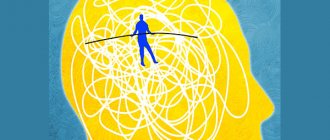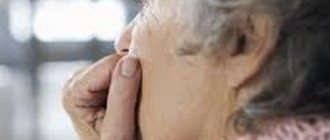The private clinic "Kordia" in Moscow provides treatment and prevention of all types of dementia. The center's doctors and psychologists have extensive experience working with people with dementia and know how to help them. If there is a person near you who has dementia, and treatment seems completely ineffective, be sure to call the specialists at our institution. They know what to do even in difficult stages. Center phone number: +7 (495) 268-09-02.
GET A FREE CONSULTATION
Causes of dementia
This disease is an acquired form of dementia. When it occurs, a person loses previously acquired skills. In the last stages of dementia, patients are not able to use acquired knowledge, care for themselves, or communicate normally with others.
The disease develops due to organic brain damage. It can also be the result of an injury or disease that negatively affects brain function. Today, doctors name more than two hundred factors contributing to the onset of dementia.
Among them:
- Alzheimer's disease;
- hypertension;
- malignant and benign neoplasms of the skull;
- atherosclerosis.
In young people, dementia can be a consequence of prolonged use of drugs, alcoholism, neurosyphilis, AIDS, viral encephalitis, chronic meningitis. In rare cases, symptoms occur with autoimmune pathologies and endocrine disorders.
Drugs for dementia in the elderly after stroke
If a person has insufficient blood flow chronically, then dementia develops slowly. But in the case of a stroke, dementia can occur suddenly and immediately. The danger is precisely bleeding in the part of the brain that is responsible for mental function. There may be isolated signs of deterioration in brain function, but this will not be dementia. But when the disorders form a whole complex, we need to talk about mental degradation due to a stroke.
Symptoms of post-stroke dementia:
- persistent memory impairment;
- uncertain, unsteady gait;
- the presence of obvious signs of neuralgia;
- loss of counting ability;
- difficulty speaking and reading;
- inadequate thinking;
- difficulty in analysis;
- depression;
- a person is lost as a person;
- inability to use knowledge.
In such a situation, it is necessary to use medications of different groups:
- psychostimulants - trigger the protective functions of the central nervous system (caffeine, Mesocarb);
- nootropics - activate the brain, improve memory (Piracetam, Oxycytam);
- glutamic acid, Cavinton - improve metabolism and blood supply to the brain;
- Arbiflex, Curantil - improve cerebral circulation;
- complex of vitamins;
- Mezapam, Phenazepam - drown out fear and melancholy.
COST OF TREATMENT FOR MENTAL DISEASES
The duration of treatment in a hospital is from 14 to 90 days, depending on the severity of the disease.
TREATMENT IN A HOSPITAL.
AMBULATORY TREATMENT
TREATMENT IN A HOSPITAL
Inpatient treatment – accommodation options
| Accommodation in a triple room | 10,000 rub./day |
| Double room | RUB 13,800/day |
| Single room of increased comfort | 16,000 rub./day |
| Treatment in a single VIP ward | 25,000 rub./day |
AMBULATORY TREATMENT
Ambulatory treatment
| psychiatrist | FOR FREE |
| Consultation with a psychiatrist (first appointment) – free of charge during hospitalization | 3,000 rub. |
| Full psychodiagnostics (all tests and procedures) | from 5,000 rub. |
| Appointment with the head physician of the clinic | 4,500 rub. |
| Consultation with a psychiatrist at home | from 4,000 rub. |
FREE CONSULTATION
The most common symptoms of dementia
Symptoms are determined by the location of the affected area of the brain and the cause of dementia. With a mild degree of impairment, the patient can perform household work, he retains the ability to think critically. As the disease progresses, brain activity is impaired. Then the person notices that his intellectual abilities have noticeably decreased. It is difficult for him to take care of himself. He finds it difficult to use standard household appliances. It gets to the point where he doesn’t understand how to answer the phone or open the front door. In severe forms, there is a complete collapse of the personality. The patient no longer notices that something is wrong with him, although he constantly behaves inappropriately. Relatives suffer more. They are the ones who seek qualified medical help.
Overview of dementia
Malfunctions that regularly occur in the functioning of the human body accumulate with age and lead to deviations in the psyche, behavior, and emotions. Dementia is considered a cognitive disorder, since the patient’s behavior changes due to mental failures - the person stops experiencing emotions, becomes depressed for no reason and slowly degrades.
With senile dementia, already in the early stages, attention, memory, thinking, speech, and with them the quality of life significantly deteriorate. Many necessary skills disappear from a person’s memory, and the disease does not allow him to remember them or acquire new ones. Over time, he becomes unable to perform even the simplest work and requires supervision and care.
First signs of illness
The symptoms and signs of the disease are similar.
The first thing relatives may notice:
- problems with remembering and reproducing information;
- loss of interest in what is happening around;
- difficulties with orientation in space;
- reducing the patient’s criticality of their own behavior.
According to experts, if you ignore dangerous symptoms for a long time, dementia will progress rapidly. Hallucinations and delusions will appear. Then very quickly the person will be lost to society.
Stages of dementia disease
The disease is progressive.
Doctors distinguish three stages:
- The first one. The symptoms are mild, although significant negative changes have already occurred in the intellectual sphere. The patient is able to understand that he needs to be treated and take medication. He is worried about the peculiarities of his condition.
- Second . Symptoms appear moderately. Intellectual impairments become more severe. It is difficult for a sick person to take care of himself. He may forget to turn off the gas, put a boiling kettle in the refrigerator, etc.
- Third. The most difficult stage. The patient is not able to eat on his own, it is difficult for him to chew food, and he does not always recognize relatives and friends. The ability to think logically is lost.
To prevent a rapid transition from the first to the third stage, you need to start therapy as early as possible and strictly follow all medical prescriptions.
Is dementia curable: doctors' opinion
The answer to the question whether dementia is curable depends on several factors - first of all, the origin of the pathology, as well as the age and general health of the patient. For example, dementia caused by drug intoxication, if detected in time, can be reversible. The consequences of traumatic brain injury, especially in young people, can also be reversible, especially if timely assistance is provided and rehabilitation is completed. The same applies to vascular dementia. Drug-induced dementia may also go away with drug treatment, although usually not immediately. As for the treatment of alcoholism, the history of alcohol abuse plays a dominant role in the prognosis.
However, in all of these cases there is no, and cannot be, confidence that the patient will restore cognitive abilities, even with a young age, good health and adequate treatment.
As for dementia caused by atrophic processes in brain tissue, the prognosis is clear - it is impossible to cure it at this stage of medical development. Doctors can slow down and sometimes stop degeneration, but it is not possible to reverse changes that have already occurred. This is why it is so important to detect pathology as early as possible. In this case, effective therapy and rehabilitation can preserve most of a person’s inherent functions and abilities and prevent personality disintegration.
Methods and methods of treatment
Problems that doctors solve when providing care to dementia patients:
- blocking and minimizing behavioral disorders;
- increasing cognitive abilities;
- improving quality of life.
The client can be treated on an outpatient basis or in a hospital - much depends on the severity of his condition.
During the work, the following techniques are used:
- Social therapy. Doctors advise relatives on the patient’s condition and the characteristics of his care.
- Psychotherapy. Both demented individuals and their immediate environment participate in the sessions. Particular attention is paid to practices that improve attention and memory characteristics.
- Pharmacotherapy. Medicines are selected that support normal brain activity.
- Psychopharmacotherapy. Drugs are used that alleviate the disorders associated with dementia.
In the case of inpatient therapy, patients attend exercise therapy, physiotherapy, massage sessions, and medicinal baths. This comprehensive treatment allows you to achieve the best results.
Does your relative have a mental disorder?
Refuses hospitalization? Are you afraid that he will harm himself and others? Call or request a free consultation.
URGENT CONSULTATION
The doctor will arrive within 1 hour . We'll take you to the hospital ourselves. Emergency hospitalization - around the clock!
Anti-anxiety and sleeping pills for older people with dementia
Patients with senile dementia often suffer from insomnia, delirium, visions, hypochondria, and aggression occurs against a background of anxiety. We must try to improve the condition of such patients through treatment. After all, these symptoms deepen the development of dementia.
- Sonapax (Thioridazine).
This drug can serve as both a neuroleptic, an antidepressant and a tranquilizer. Plus it is used as a sedative, hypnotic and anti-manic agent. But this is not the whole list of what Sonapax can do. His arsenal includes the fight against phobias, anxiety, and aggressive states. They treat depression, as well as various types of dementia: vascular, Alzheimer's and combined. This medicine is used to relieve motor agitation and sleep disorders.
- Phenazepam.
This drug is not recommended for frequent use. The exception is an acute condition, and even then it is a one-time appointment. During the entire course of treatment, a deterioration in well-being and progression of dementia are observed.
- Phenibut.
This is a more effective medicine. Positive properties:
- improves impulse connections between brain cells;
- reduces vascular tone;
- normalizes the process of brain metabolism;
- improves blood circulation and oxygen saturation of neurons;
- removes anxiety and fear;
- reduces tension;
- promotes normal, timely sleep;
- restores memories;
- speeds up the reaction;
- normalizes coordination of movements;
- returns adequate speech;
- increases mental and physical performance with long-term use.
The main recommendation: strictly adhere to all doctor’s prescriptions. This applies to dosage, course duration and the medications themselves.
We recommend
“Lonely older people: how to help them” Read more
Drug treatment of the disease - medications used
Traditional treatment for dementia is pointless - specialized medications must be used. Doctors at the Cordia clinic select them taking into account the stage of the disease and the severity of its course.
Help with dementia disorders:
- Drugs that improve brain activity. This refers to anticholinesterase medications and NMDA glutamate receptor blockers. They have neuroprotective properties, do not allow neurons to be destroyed, and enhance the transmission of nerve impulses. With their help, it is possible to improve memory and increase focus.
- Neuroleptics. Used to correct behavioral abnormalities. Reduce psychomotor excitability, perception deception, delirium. Since medications in this group often cause unwanted side effects, they can only be used under constant medical supervision.
- Antidepressants. Fighting depression. May contain fluoxetine, mianserin, fluvoxamine maleate and other active substances. The selection of a suitable medicine can only be carried out by a qualified doctor.
Since patients with dementia often complain of light sleep and insomnia, many are additionally prescribed sleeping pills.
Drugs for the treatment of vascular dementia in the elderly
A group of medications - antipsychotics and vascular drugs - are used specifically for this diagnosis. If the course of the disease is accompanied by psychopathy, feelings of anxiety and restlessness, fears and delirium, as well as Alzheimer's disease, the patient will need medications Propazine, Aminazine, Tizercin, Etaperazine, Melleril, Moditen. Let's talk about some of them in more detail.
- Propazin.
Has a sedative (calming) and hypnotic effect. Reduces anxiety, symptoms of depression and phobias. Does not cause tremors and shuffling steps. However, it does not eliminate delirium and visions.
- Tizercin (Levomepromazine).
Relieves anxiety more effectively than Aminazine. Eliminates delirium. In small doses it acts as a sleeping pill.
A big problem for older people is the functioning of blood vessels. The arteries of the brain must have good patency. To rid them of atherosclerotic plaques, expand the lumen and reduce spasms, special drugs have been developed. Medicines, calcium antagonists, remove spasms of the arteries, while the tension in the veins almost does not drop. The blood supply with oxygen is normalized, which is delivered to the brain without obstacles. The second generation of drugs is now in use and work is underway on the third.
Second generation of this group:
- Isradipin (Lomir).
- Anipamin, Gallopamil, Falipamin.
- Felodipine (Plendil), Amlodipine (Norvax).
- Clentiazem.
Positive properties of these drugs in comparison with other drugs:
- prolonged action;
- act selectively;
- have a minimum of side effects.
An alternative to these drugs can be herbal medicines: periwinkle, ginkgo biloba, vitamins B and P and nicotinic acid derivatives. But before taking these medications, which have virtually no contraindications, you need to consult a doctor. Only a specialist will be able to draw up a treatment plan taking into account the condition of the body and the existing pathology.
We recommend
“Boarding home for the elderly: how to place an elderly relative there” Read more
How are patients treated in a hospital?
Hospitalization is indicated at any stage of the disease. At the initial stages, it is needed to select the optimal treatment that will slow down the progression of dementia. In the later form, doctors take measures to alleviate the patient’s condition, provide him with high-quality and complete care, and improve his quality of life.
At the Cordia hospital, patients are monitored around the clock. For each applicant, specialists develop unique treatment programs that allow them to achieve positive results in a short time.
It is important to understand that it is impossible to completely cure dementia, but it is possible to stop its progression. To do this, you need to be observed by experienced doctors. Make an appointment with Cordia doctors by calling +7 (495) 268-09-02 . We are ready to help you and your loved ones.
Dementia drugs for older people without prescriptions
If loved ones have an idea of the real condition of a person with dementia and know how to help him without going to the doctor, some medications can be purchased in pharmacies without a prescription.
- Melaxen.
Neuroleptic, used as an excipient. Acts as an anticonvulsant and sedative, fights delusions and hallucinations, and is recommended as a sleeping pill. There are also contraindications for use: myeloma, leukemia, autoimmune diseases, kidney disorders, as well as hypersensitivity to the components of the drug. Analogues are Circadin and Vita-melatonin.
- Donormil.
Another drug that is widely used for dementia, as it has a hypnotic and sedative effect. The release form is tablets, which eliminates difficulties in dosage and use. If the dosage is incorrect, side effects may occur.
This drug should not be taken if you have urinary tract diseases, congenital galactosemia, closed-angle glaucoma, or hypersensitivity to substances in its composition.
Reviews from elderly patients about this drug for dementia show that they are satisfied with the actions of the medication. It also has analogues: Bromcamphor, Alora, Adonis-Brom.
- Afobazol.
It is a selective anxiolytic that can improve cognitive function. Recommended for dementia and asthenia. The drug is notable for the fact that it has very few contraindications. The only prohibition on taking it is individual hypersensitivity to its composition. Positive qualities include the prolonged duration of its action. Analogs are Adaptol, Tranquilar, Mebical.









